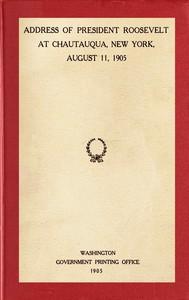|
|
Read this ebook for free! No credit card needed, absolutely nothing to pay.Words: 7595 in 2 pages
This is an ebook sharing website. You can read the uploaded ebooks for free here. No credit cards needed, nothing to pay. If you want to own a digital copy of the ebook, or want to read offline with your favorite ebook-reader, then you can choose to buy and download the ebook.

: Address of President Roosevelt at Chautauqua New York August 11 1905 by Roosevelt Theodore - Speeches addresses etc.; Monroe doctrine; Finance Dominican Republic; Corporation law United States@FreeBooksThu 08 Jun, 2023 ADDRESS OF PRESIDENT ROOSEVELT AT CHAUTAUQUA, NEW YORK, AUGUST 11, 1905
WASHINGTON GOVERNMENT PRINTING OFFICE 1905 To-day I wish to speak to you on one feature of our national foreign policy and one feature of our national domestic policy. The Monroe Doctrine is not a part of international law. But it is the fundamental feature of our entire foreign policy so far as the Western Hemisphere is concerned, and it has more and more been meeting with recognition abroad. The reason why it is meeting with this recognition is because we have not allowed it to become fossilized, but have adapted our construction of it to meet the growing, changing needs of this hemisphere. Fossilization, of course, means death, whether to an individual, a government, or a doctrine. It is out of the question to claim a right and yet shirk the responsibility for exercising that right. When we announce a policy such as the Monroe Doctrine we thereby commit ourselves to accepting the consequences of the policy, and these consequences from time to time alter. Let us look for a moment at what the Monroe Doctrine really is. It forbids the territorial encroachment of non-American powers on American soil. Its purpose is partly to secure this Nation against seeing great military powers obtain new footholds in the Western Hemisphere, and partly to secure to our fellow-republics south of us the chance to develop along their own lines without being oppressed or conquered by non-American powers. As we have grown more and more powerful our advocacy of this doctrine has been received with more and more respect; but what has tended most to give the doctrine standing among the nations is our growing willingness to show that we not only mean what we say and are prepared to back it up, but that we mean to recognize our obligations to foreign peoples no less than to insist upon our own rights. We can not permanently adhere to the Monroe Doctrine unless we succeed in making it evident in the first place that we do not intend to treat it in any shape or way as an excuse for aggrandizement on our part at the expense of the republics to the south of us; second, that we do not intend to permit it to be used by any of these republics as a shield to protect that republic from the consequences of its own misdeeds against foreign nations; third, that inasmuch as by this doctrine we prevent other nations from interfering on this side of the water, we shall ourselves in good faith try to help those of our sister republics, which need such help, upward toward peace and order. As regards the first point we must recognize the fact that in some South American countries there has been much suspicion lest we should interpret the Monroe Doctrine in some way inimical to their interests. Now let it be understood once for all that no just and orderly government on this continent has anything to fear from us. There are certain of the republics south of us which have already reached such a point of stability, order, and prosperity that they are themselves, although as yet hardly consciously, among the guarantors of this doctrine. No stable and growing American republic wishes to see some great non-American military power acquire territory in its neighborhood. It is the interest of all of us on this continent that no such event should occur, and in addition to our own Republic there are now already republics in the regions south of us which have reached a point of prosperity and power that enables them to be considerable factors in maintaining this doctrine which is so much to the advantage of all of us. It must be understood that under no circumstances will the United States use the Monroe Doctrine as a cloak for territorial aggression. Should any of our neighbors, no matter how turbulent, how disregardful of our rights, finally get into such a position that the utmost limits of our forbearance are reached, all the people south of us may rest assured that no action will ever be taken save what is absolutely demanded by our self-respect; that this action will not take the form of territorial aggrandizement on our part, and that it will only be taken at all with the most extreme reluctance and not without having exhausted every effort to avert it. As to the second point, if a republic to the south of us commits a tort against a foreign nation, such, for instance, as wrongful action against the persons of citizens of that nation, then the Monroe Doctrine does not force us to interfere to prevent punishment of the tort, save to see that the punishment does not directly or indirectly assume the form of territorial occupation of the offending country. The case is more difficult when the trouble comes from the failure to meet contractual obligations. Our own Government has always refused to enforce such contractual obligations on behalf of its citizens by the appeal to arms. It is much to be wished that all foreign governments would take the same view. But at present this country would certainly not be willing to go to war to prevent a foreign government from collecting a just debt or to back up some one of our sister republics in a refusal to pay just debts; and the alternative may in any case prove to be that we shall ourselves undertake to bring about some arrangement by which so much as is possible of the just obligations shall be paid. Personally I should always prefer to see this country step in and put through such an arrangement rather than let any foreign country undertake it. I do not want to see any foreign power take possession permanently or temporarily of the custom-houses of an American republic in order to enforce its obligations, and the alternative may at any time be that we shall be forced to do so ourselves. Finally, and what is in my view, really the most important thing of all, it is our duty, so far as we are able, to try to help upward our weaker brothers. Just as there has been a gradual growth of the ethical element in the relations of one individual to another, so that with all the faults of our Christian civilization it yet remains true that we are, no matter how slowly, more and more coming to recognize the duty of bearing one another's burdens, similarly I believe that the ethical element is by degrees entering into the dealings of one nation with another. Free books android app tbrJar TBR JAR Read Free books online gutenberg More posts by @FreeBooks
: The Sons of Japheth by Wilson Richard Engle Robert Illustrator - Science fiction; Short stories; Time travel Fiction; Apocalyptic fiction; Noah's ark Fiction@FreeBooksThu 08 Jun, 2023

: The Catspaw by Smith George O George Oliver Orban Paul Illustrator - Science fiction; Space ships Fiction; Human-alien encounters Fiction; Dreams Fiction; Technology Fiction; Communication Fiction@FreeBooksThu 08 Jun, 2023
|
Terms of Use Stock Market News! © gutenberg.org.in2025 All Rights reserved.






